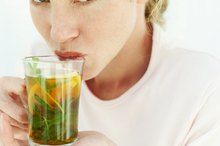What does fact checked mean?
At Healthfully, we strive to deliver objective content that is accurate and up-to-date. Our team periodically reviews articles in order to ensure content quality. The sources cited below consist of evidence from peer-reviewed journals, prominent medical organizations, academic associations, and government data.
- Journal of Strength and Conditioning Research; Efficacy of Acute Caffeine Ingestion for Short-Term High-Intensity Exercise Performance: A Systematic Review; T.A. Astorino and D.W. Roberson
- Journal of Strength and Conditioning Research; Efficacy of Acute Caffeine Ingestion for Short-Term High-Intensity Exercise Performance: A Systematic Review; T.A. Astorino and D.W. Roberson
- MayoClinic.com: Exercise for Weight Loss - Calories Burned in 1 Hour
- American Journal of Clinical Nutrition; Consumption of Added Sugars is Decreasing in the United States; J.A. Welsh, et al.
- American Journal of Clinical Nutrition; Consumption of Added Sugars is Decreasing in the United States; J.A. Welsh, et al.
- American Dietetic Association: Hydrate Right
The information contained on this site is for informational purposes only, and should not be used as a substitute for the advice of a professional health care provider. Please check with the appropriate physician regarding health questions and concerns. Although we strive to deliver accurate and up-to-date information, no guarantee to that effect is made.
Does Drinking Soda Hurt Cardiovascular Endurance?
The sugar in sweetened soda has been linked to obesity, diabetes and heart disease, all of which can impact cardiovascular endurance 4. Consumption of soda also can cause kidney issues, which can indirectly decrease endurance. Caffeine in soda and other substances may boost short-term athletic endurance, but water and sports drinks are better choices to keep you hydrated.
Heart Health
If you’re very active, you might not worry about the calories -- about 135 per can -- in sweetened soda. A person weighing 160 pounds can burn off the calories in three cans of soda by jogging or playing basketball for one hour, but the sugar can elevate your triglycerides, a type of fat that clogs your arteries and makes you more susceptible to heart attacks and strokes. The American Heart Association recommends you drink no more than three servings of soda per week and limit daily consumption to all types of added sugar to no more than 5 percent of your daily total -- about 100 calories for women and 150 calories for men.
Caffeine
Caffeine Free Soft Drinks
Learn More
For short-term cardiovascular endurance, soda with caffeine might give you a boost. C.A. Astorino, a researcher in the department of kinesiology at California State University San Marcos, reviewed 17 studies on the effects of caffeine on team sports and power-based sports 1. Eleven of the studies found caffeine improved endurance but mostly among elite athletes who did not regularly consume caffeine. Six studies found caffeine significantly improved resistance training, according to the report published in the “Journal of Strength and Conditioning Research” in January 2010 1.**
- For short-term cardiovascular endurance, soda with caffeine might give you a boost.
Kidney Disease
Your overall health will affect cardiovascular endurance. A variety of studies link the consumption of soda to kidney disease, including kidney failure. A study of more than 15,000 patients found that drinking two or more sodas daily could more than double the risk of developing kidney disease, according to research led by A.S. Bomback of the Department of Medicine at Columbia University. Bomback’s report, published in the August 2010 edition of “Kidney International,” said high-fructose corn syrup in soda may be to blame. Phosphorus in cola and other dark-colored soda may worsen kidney disease, according to the National Kidney Foundation.
- Your overall health will affect cardiovascular endurance.
- A variety of studies link the consumption of soda to kidney disease, including kidney failure.
Hydration
Can Xyience Energy Drinks Help You Lose Weight?
Learn More
Staying hydrated will increase your cardiovascular endurance. The American Dietetic Association recommends water and sports drinks 4. The ADA suggests drinking water before, during and after moderate activity of 60 minutes or less and consuming sports drinks for moderate- to high-intensity exercise that lasts longer than an hour 1.** If you sweat heavily during exercise, add salt to your sports drink or eat salty foods before your workout, according to the ADA. Besides water and sports drinks, soup and vegetable juice can help you rehydrate after exercise.
- Staying hydrated will increase your cardiovascular endurance.
- Besides water and sports drinks, soup and vegetable juice can help you rehydrate after exercise.
Related Articles
References
- Journal of Strength and Conditioning Research; Efficacy of Acute Caffeine Ingestion for Short-Term High-Intensity Exercise Performance: A Systematic Review; T.A. Astorino and D.W. Roberson
- MayoClinic.com: Exercise for Weight Loss - Calories Burned in 1 Hour
- United States Department of Agriculture Nutrient Database
- Circulation; Triglycerides and Cardiovascular Disease: A Scientific Statement From the American Heart Association; Michael Miller, et al.
- American Journal of Clinical Nutrition; Consumption of Added Sugars is Decreasing in the United States; J.A. Welsh, et al.
- Coca-Cola Bottle, 12 fl oz. U.S. Department of Agriculture. Published February 27, 2020.
- 2015-2020 Dietary Guidelines for Americans. U.S. Department of Health and Human Services.
- How much sugar is too much? American Heart Association.
- Freeman CR, Zehra A, Ramirez V, Wiers CE, Volkow ND, Wang GJ. Impact of sugar on the body, brain, and behavior. Front Biosci (Landmark Ed). 2018;23:2255-2266. Published 2018 Jun 1.
- Pasiakos SM, McLellan TM, Lieberman HR. The effects of protein supplements on muscle mass, strength, and aerobic and anaerobic power in healthy adults: a systematic review. Sports Med. 2015;45(1):111-131. doi:10.1007/s40279-014-0242-2
- Blom WA, Lluch A, Stafleu A, et al. Effect of a high-protein breakfast on the postprandial ghrelin response. Am J Clin Nutr. 2006;83(2):211-220. doi:10.1093/ajcn/83.2.211
- Tipton KD. Nutritional Support for Exercise-Induced Injuries. Sports Med. 2015;45 Suppl 1:S93-S104. doi:10.1007/s40279-015-0398-4
- Kerstetter JE, Kenny AM, Insogna KL. Dietary protein and skeletal health: a review of recent human research. Curr Opin Lipidol. 2011;22(1):16-20. doi:10.1097/MOL.0b013e3283419441
- Paddon-Jones D, Short KR, Campbell WW, Volpi E, Wolfe RR. Role of dietary protein in the sarcopenia of aging. Am J Clin Nutr. 2008 May;87(5):1562S-1566S. doi: 10.1093/ajcn/87.5.1562S. PMID: 18469288.
- Maughan RJ, Griffin J. Caffeine ingestion and fluid balance: a review. J Hum Nutr Diet. 2003 Dec;16(6):411-20. doi: 10.1046/j.1365-277x.2003.00477.x. PMID: 19774754.
- Lete I, Allué J. The Effectiveness of Ginger in the Prevention of Nausea and Vomiting during Pregnancy and Chemotherapy. Integr Med Insights. 2016;11:11-17. Published 2016 Mar 31. doi:10.4137/IMI.S36273
- Laura Helm, Ian A. Macdonald, Impact of beverage intake on metabolic and cardiovascular health, Nutrition Reviews, Volume 73, Issue suppl_2, 1 September 2015, Pages 120–129, https://doi.org/10.1093/nutrit/nuv049
- Ma J, Jacques PF, Meigs JB, et al. Sugar-Sweetened Beverage but Not Diet Soda Consumption Is Positively Associated with Progression of Insulin Resistance and Prediabetes. J Nutr. 2016;146(12):2544-2550. doi:10.3945/jn.116.234047
- Rippe JM, Angelopoulos TJ. Relationship between Added Sugars Consumption and Chronic Disease Risk Factors: Current Understanding. Nutrients. 2016;8(11):697. Published 2016 Nov 4. doi:10.3390/nu8110697
- Bucher Della Torre S, Keller A, Laure Depeyre J, Kruseman M. Sugar-Sweetened Beverages and Obesity Risk in Children and Adolescents: A Systematic Analysis on How Methodological Quality May Influence Conclusions. J Acad Nutr Diet. 2016;116(4):638-659. doi:10.1016/j.jand.2015.05.020
- Bray GA, Nielsen SJ, Popkin BM. Consumption of high-fructose corn syrup in beverages may play a role in the epidemic of obesity [published correction appears in Am J Clin Nutr. 2004 Oct;80(4):1090]. Am J Clin Nutr. 2004;79(4):537-543. doi:10.1093/ajcn/79.4.537
- Vartanian LR, Schwartz MB, Brownell KD. Effects of soft drink consumption on nutrition and health: a systematic review and meta-analysis. Am J Public Health. 2007;97(4):667-675. doi:10.2105/AJPH.2005.083782
- Pollock NK, Bundy V, Kanto W, et al. Greater fructose consumption is associated with cardiometabolic risk markers and visceral adiposity in adolescents [published correction appears in J Nutr. 2013 Jan;143(1):123]. J Nutr. 2012;142(2):251-257. doi:10.3945/jn.111.150219
- Elffers TW, de Mutsert R, Lamb HJ, et al. Body fat distribution, in particular visceral fat, is associated with cardiometabolic risk factors in obese women. PLoS One. 2017;12(9):e0185403. Published 2017 Sep 28. doi:10.1371/journal.pone.0185403
- Yudkin J. Sugar and ischaemic heart disease. Practitioner. 1967;198(187):680-683.
- Liu S, Willett WC, Stampfer MJ, et al. A prospective study of dietary glycemic load, carbohydrate intake, and risk of coronary heart disease in US women. Am J Clin Nutr. 2000;71(6):1455-1461. doi:10.1093/ajcn/71.6.1455
- Cohen L, Curhan G, Forman J. Association of sweetened beverage intake with incident hypertension. J Gen Intern Med. 2012;27(9):1127-1134. doi:10.1007/s11606-012-2069-6
- Welsh JA, Sharma A, Cunningham SA, Vos MB. Consumption of added sugars and indicators of cardiovascular disease risk among US adolescents. Circulation. 2011;123(3):249-257. doi:10.1161/CIRCULATIONAHA.110.972166
- Assy N, Nasser G, Kamayse I, et al. Soft drink consumption linked with fatty liver in the absence of traditional risk factors. Can J Gastroenterol. 2008;22(10):811-816. doi:10.1155/2008/810961
- Jiantao Ma, Caroline S. Fox, Paul F. Jacques, Elizabeth K. Speliotes, Udo Hoffmann, Caren E. Smith, Edward Saltzman, Nicola M. McKeown,Sugar-sweetened beverage, diet soda, and fatty liver disease in the Framingham Heart Study cohorts. Journal of Hepatology 63;2(2015). https://doi.org/10.1016/j.jhep.2015.03.032.
- Avena NM, Bocarsly ME, Hoebel BG. Animal models of sugar and fat bingeing: relationship to food addiction and increased body weight. Methods Mol Biol. 2012;829:351-365. doi:10.1007/978-1-61779-458-2_23
- Avena NM, Rada P, Hoebel BG. Evidence for sugar addiction: behavioral and neurochemical effects of intermittent, excessive sugar intake. Neurosci Biobehav Rev. 2008;32(1):20-39. doi:10.1016/j.neubiorev.2007.04.019
- Choi HK, Willett W, Curhan G. Fructose-rich beverages and risk of gout in women. JAMA. 2010;304(20):2270-2278. doi:10.1001/jama.2010.1638
- Choi HK, Curhan G. Soft drinks, fructose consumption, and the risk of gout in men: prospective cohort study. BMJ. 2008;336(7639):309-312. doi:10.1136/bmj.39449.819271.BE
- Jamnik J, Rehman S, Blanco Mejia S, et al. Fructose intake and risk of gout and hyperuricemia: a systematic review and meta-analysis of prospective cohort studies. BMJ Open. 2016;6(10):e013191. Published 2016 Oct 3. doi:10.1136/bmjopen-2016-013191
- Tooth. American Dental Association. https://www.mouthhealthy.org/en/az-topics/t/tooth.
- Cheng R, Yang H, Shao MY, Hu T, Zhou XD. Dental erosion and severe tooth decay related to soft drinks: a case report and literature review. J Zhejiang Univ Sci B. 2009;10(5):395-399. doi:10.1631/jzus.B0820245
- Hanover LM, White JS. Manufacturing, composition, and applications of fructose. Am J Clin Nutr. 1993;58(5 Suppl):724S-732S. doi:10.1093/ajcn/58.5.724S
- Meghan B. Azad, Ahmed M. Abou-Setta, Bhupendrasinh F. Chauhan, et al. Nonnutritive sweeteners and cardiometabolic health: a systematic review and meta-analysis of randomized controlled trials and prospective cohort studies. CMAJ Jul 2017, 189 (28) E929-E939; DOI: 10.1503/cmaj.161390
- Fowler, S.P., Williams, K., Resendez, R.G., Hunt, K.J., Hazuda, H.P. and Stern, M.P. (2008), Fueling the Obesity Epidemic? Artificially Sweetened Beverage Use and Long‐term Weight Gain. Obesity, 16: 1894-1900. doi:10.1038/oby.2008.284
- Fowler SP, Williams K, Hazuda HP. Diet soda intake is associated with long-term increases in waist circumference in a biethnic cohort of older adults: the San Antonio Longitudinal Study of Aging. J Am Geriatr Soc. 2015;63(4):708-715. doi:10.1111/jgs.13376
Writer Bio
Kathryn Gilhuly is a wellness coach based in San Diego. She helps doctors, nurses and other professionals implement lifestyle changes that focus on a healthy diet and exercise. Gilhuly holds a Master of Science in health, nutrition and exercise from North Dakota State University.








